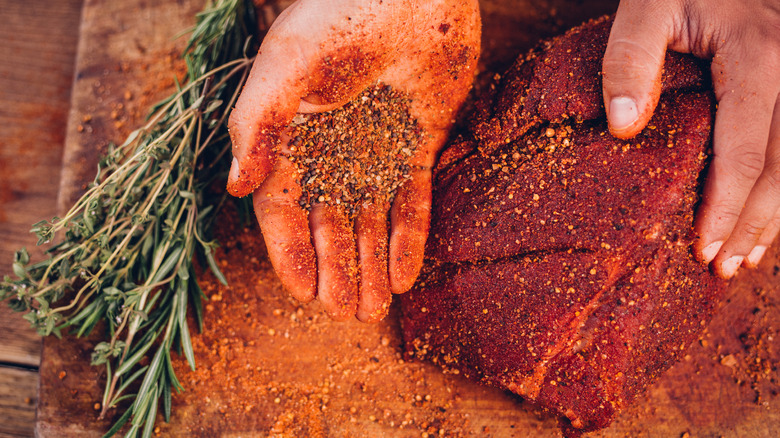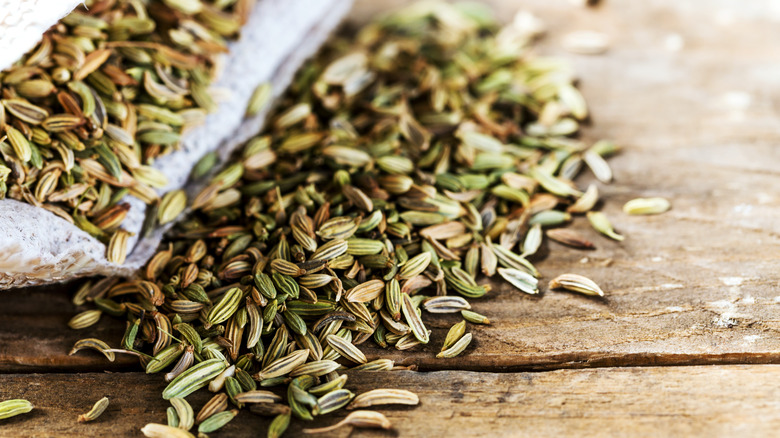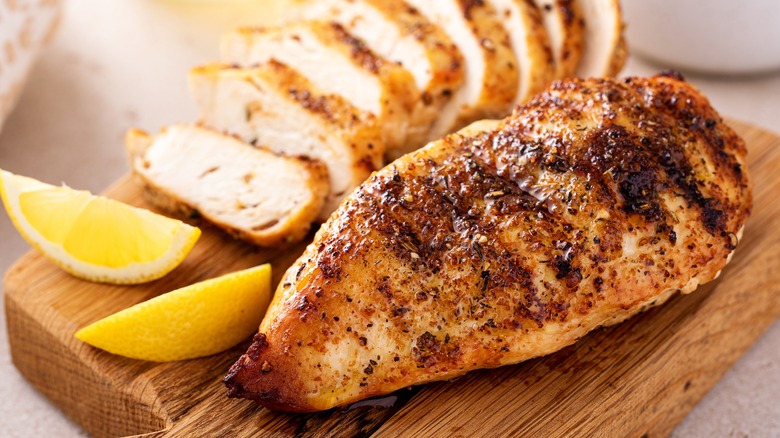Fennel Seeds Are The Subtly Sweet Ingredient Missing From Your Meat Rubs
Meat rubs can be made to accommodate just about any flavor profile and craving, each suitable for your protein picks for any meal. Whether brown sugar or barbecue, Southwest or Southeast Asian, a concoction of herbs and spices can be such a simple way to enhance just about anything you choose to cook up.
It's always a snap to grab a pre-made rub from the supermarket or perhaps something special from your favorite small-batch spice source, but it's also extra fun and easy to make a DIY rub all of your own. Simply selecting your favorite spices and blending them is not only a great way to endlessly customize your meal plan, but a fun, ongoing, creative experiment to hone the exact ratio that's satisfying to you. You can even gift your signature rubs as an impressive gift for your friends.
Cumin, coriander, black or white pepper, paprika, ground ginger, cardamom, turmeric, dried herbs like thyme, rosemary, oregano, sugars, and dried citrus zests can all be mixed and matched for different kinds of cuisines and dishes. But there is one ingredient that, if you're leaving out, you're missing out, and that's the small but mighty flavorful fennel seed.
What are fennel seeds?
Fennel falls into a category that can be polarizing in the culinary community. It is often described as being licorice-like, and that can be off-putting to folks who run screaming from anything that resembles that infamous black jelly bean. And yet the flavor of the fennel seed — which is reminiscent of the fennel bulb itself, though slightly woodier, warmer, and earthier — is an unexpected pop of sweetness when used in savory applications.
With meats, fennel seeds elevate the flavor of everything from pork and poultry, to steak and even seafood by bringing a balancing complexity to the table. In addition to being delicious, these little greenish oval seeds come with some big health benefits, too. They boast calcium, iron, magnesium, and manganese, and according to Healthline even help manage blood pressure.
If you opt to include fennel seeds in your culinary repertoire, it's best to buy them whole and grind them at home as you need them. This will ensure freshness, which translates to a bigger and more authentic flavor. You can do this with a spice or coffee grinder, or with a pestle and mortar after dry toasting lightly on the stovetop.
Ideas for your fennel-imbued spice rub
To make your own fennel-infused meat rub, a few complementary flavors can help inspire your combination. Cumin, coriander, clove, cinnamon, ginger, paprika, garlic, lemon zest, nutmeg, oregano, and thyme are all ideal starting points.
Once you decide on your spice mixture, you will quickly find ways to work this magic dust into your cooking routine. Fennel seeds are prevalent in Southeast Asian cuisines and play a starring role in Chinese five-spice, which is exceedingly versatile and adds depth and complexity to everything from pork ribs to turkey and duck. In Thai, Indonesian, and Malaysian cooking, you'll often find fennel seeds in spice blends that flavor curries and stir-fries, while Mexican cuisine features them as part of classic mole sauce spice combinations and marinades. Fennel seeds find lots of delicious homes in Italian cuisine, too, where they're often incorporated into sausage and charcuterie, and even some breakfast and dessert preparations.
Dishes like fennel-crusted salmon are exceptional in the seafood category, while a fennel and chili-rubbed pork roast make great use of the ingredient's friendliness with savory meat dishes. Fennel seeds are also fantastic with citrus and work beautifully on roasted chicken with lemon and rosemary. If you want to opt out of a meat dish, though, you can also sprinkle a crushed fennel seed rub over orange zest and goat cheese ravioli, or incorporate it into a shaved apple salad with manchego and crunchy hazelnuts.


